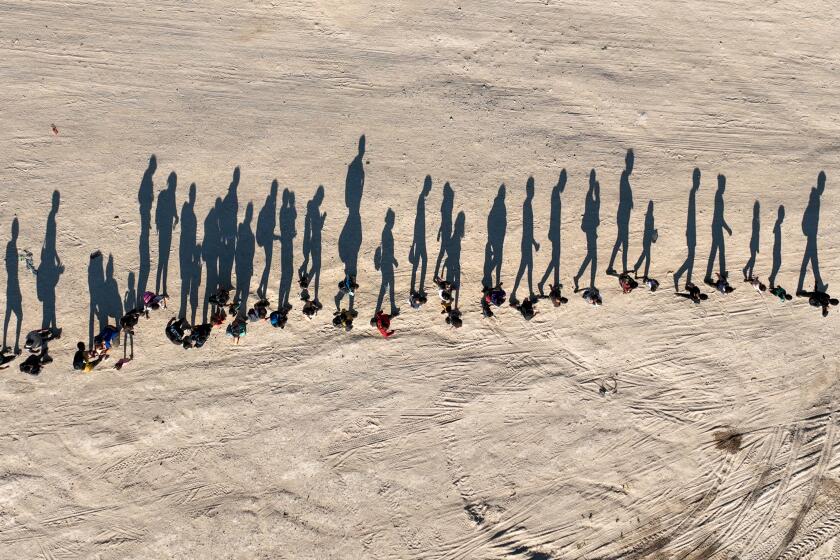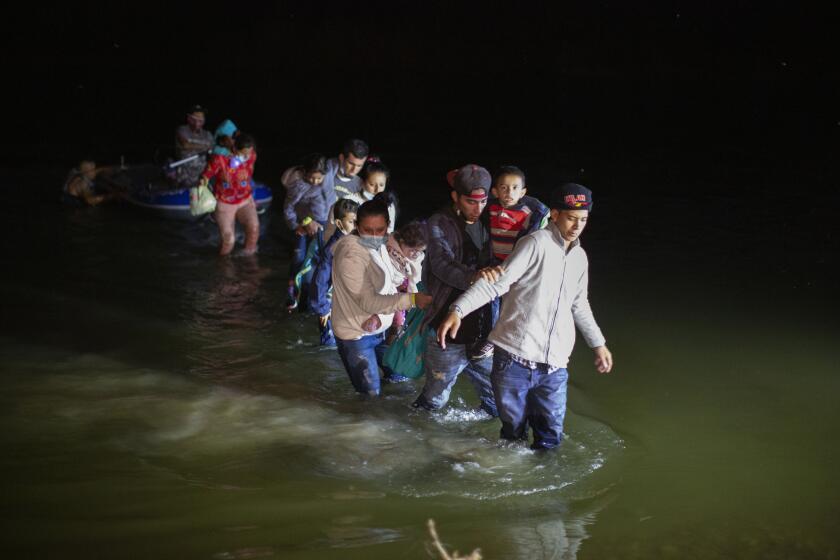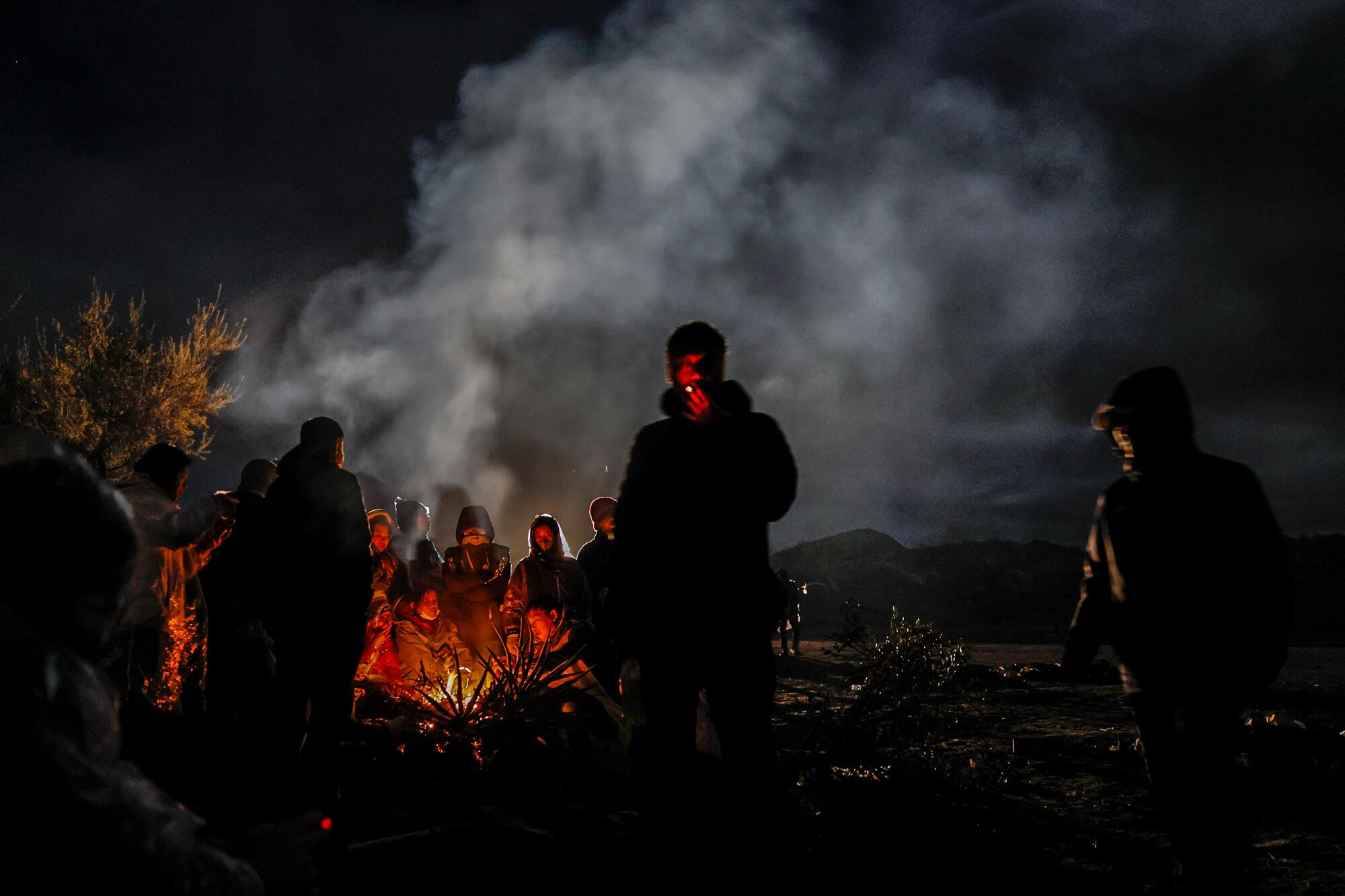
For the last three months, residents in this remote border community in southeastern San Diego County have seen their population nearly double, climbing from 600 to 1,200 as migrants from around the globe cross over from Mexico.
They cross into the punishing desert terrain at a point where the 30-foot steel border wall erected across the county in the Trump era abruptly ends, transitioning to erratic fencing and boulders riddled with gaps.
Once on American soil, the migrants subsist in makeshift open-air camps, where the number of tents are not nearly enough for the number of migrants. For warmth, they huddle around campfires fueled by brush and felled trees. When it’s time to sleep, many are left to rely on plastic tarps and thin blankets to shelter them from the wind and nighttime lows that can fall below 40 degrees.
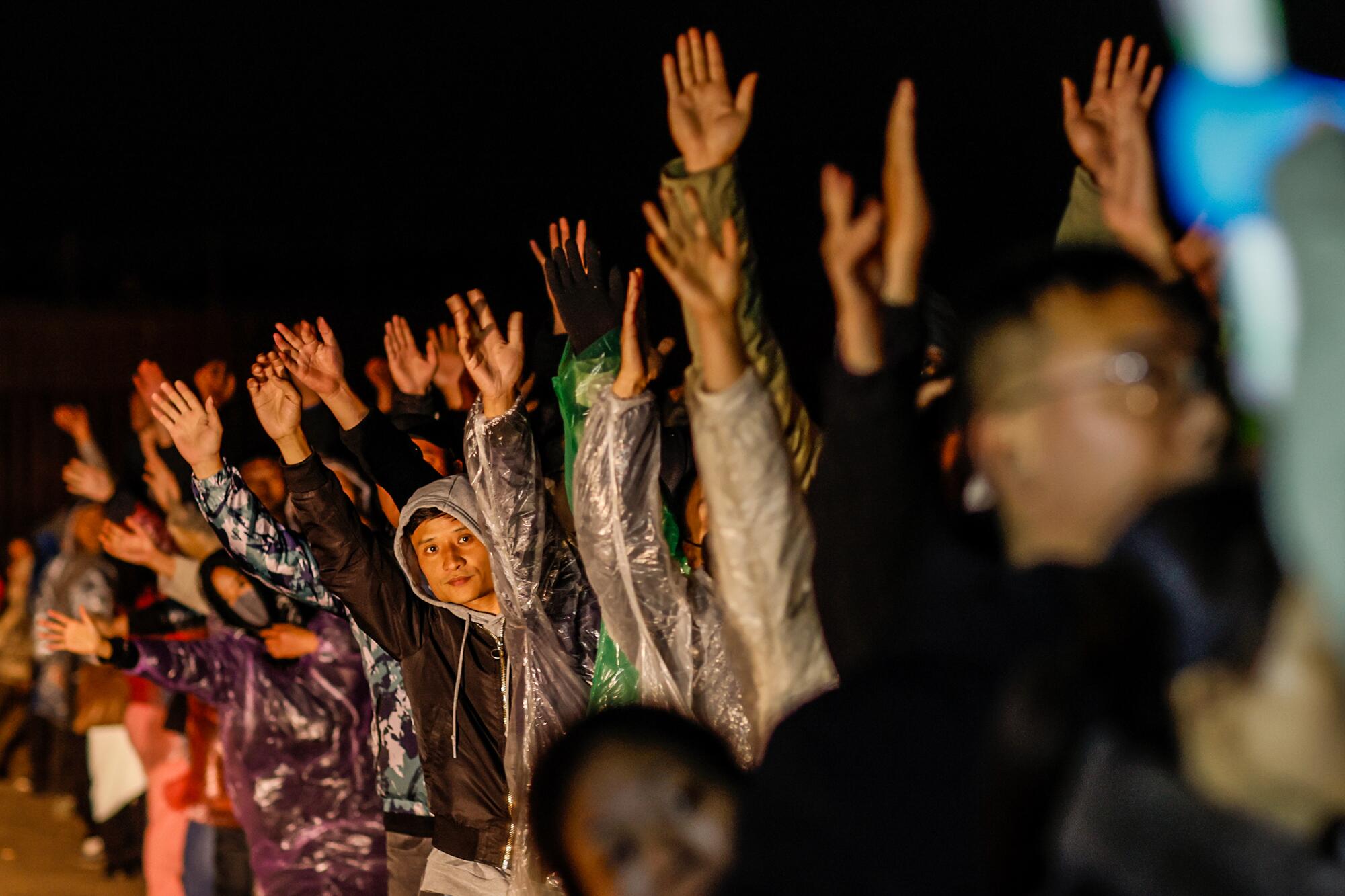
Jacumba Hot Springs is not an official U.S. Customs and Border Protection detention site. But the sheer number of migrants crossing the border day after day has made it an unofficial one. The Border Patrol has stationed field agents nearby to keep watch over the camp, and migrants say authorities have told them to wait there for transfer to an official processing facility. Border Patrol gives them wristbands printed with the day they arrived. Often, women and children get picked up quickly. But for many others, their time at the camps can stretch for days.
A senior official with Customs and Border Protection who spoke on background acknowledged the camp is serving as a sort of informal holding spot. Agency resources are spread thin, the official said, and Border Patrol isn’t set up to handle the recent surge in migrants crossing the border in southeastern San Diego County.
The agency is compelling migrants to camp until the agency is able to transfer them to established detention centers, which are set up to provide food, shelter and medical care. During the waiting period, the migrants have no such provisions. The official said agents are providing the bare minimum, including water, and calling in medical providers if needed.
Local volunteers have stepped into that survival gap, providing critical services, including food, tents, clothing and aid.
Last weekend, the migrants camped near Jacumba Hot Springs had made their way from multiple countries, including China, Colombia, Guatemala, Honduras and Peru. Many said they came fleeing violence or in search of a new life.
Volunteers say an average of 500 migrants are now living in three camps in the area on any given day. On Thanksgiving Day, they were overwhelmed by the number of people who remained at the camp by dinnertime and 50 migrants went without food.
“It really just became an avalanche,” said resident Samuel Schultz, who is coordinating with advocacy organizations to get supplies to the camps.
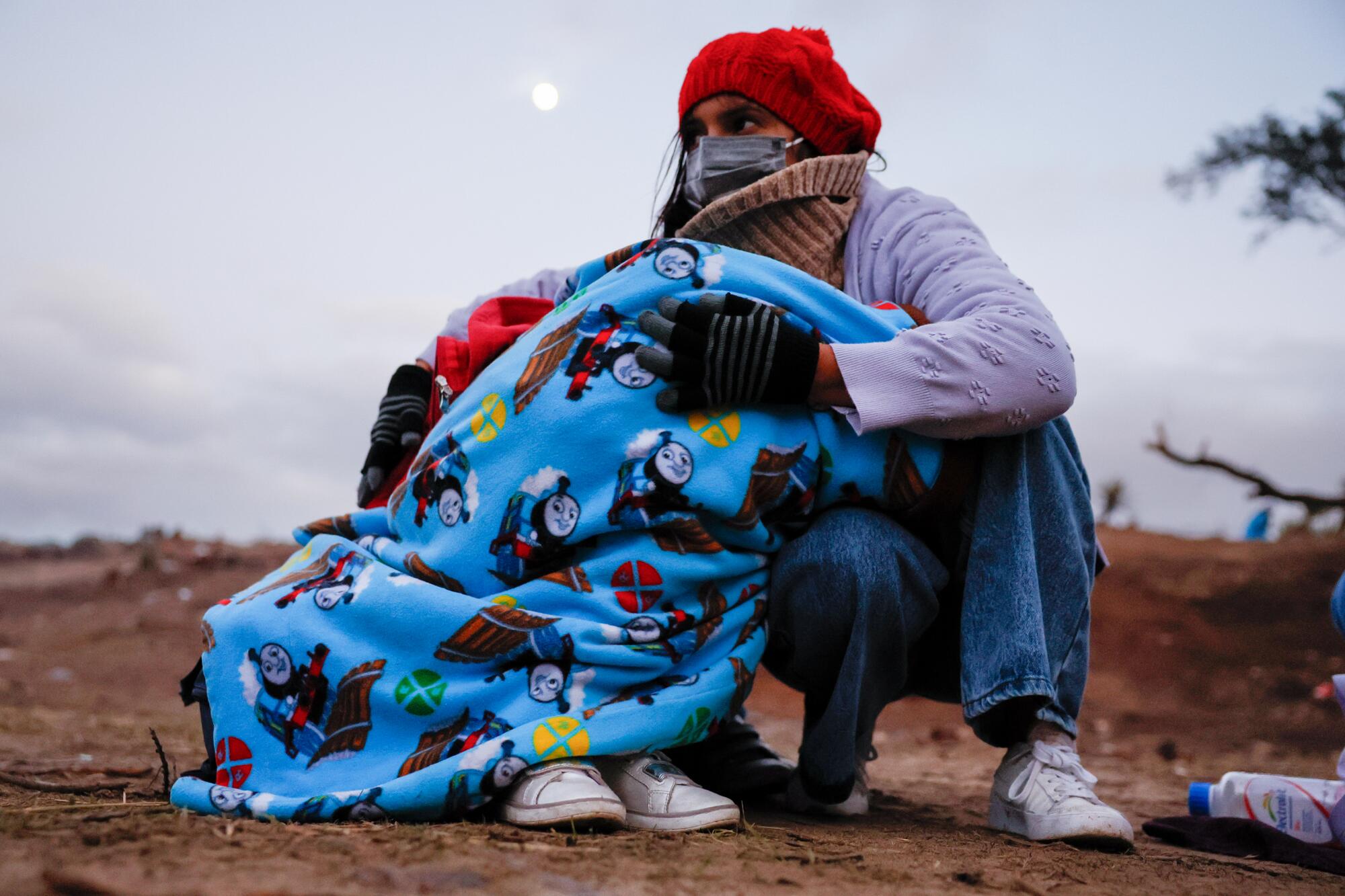
Ten weeks ago, he said, the volunteers were the only source of water for migrants as temperatures soared above 100 degrees in the Mountain Empire. Now, he said, they are the only source of protection in rugged winter conditions.
Along with South American migrants and refugees, a rising number of Chinese migrants are arriving in the U.S. by crossing the southern border. Schultz said they make up about half of the migrants arriving in Jacumba’s open-air camps.
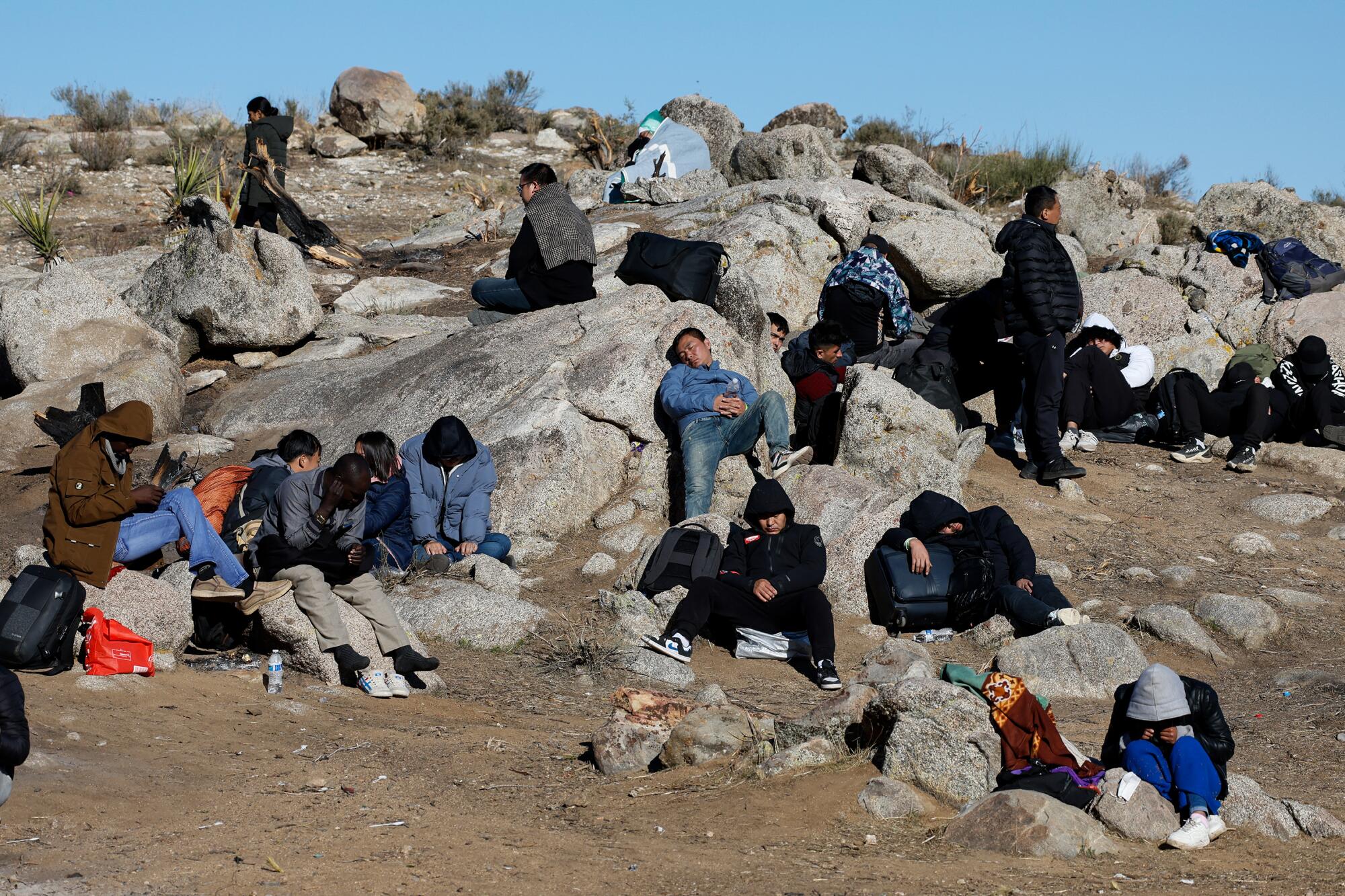
The volunteers are able to feed the migrants twice a day with funds from Al Otro Lado, a nonprofit legal advocacy group, and other immigrant rights organizations. Erika Pinheiro, executive director of Al Otro Lado, said she is worried about money drying up. Already, it’s costing $150,000 monthly just to give the migrants water and food twice a day, which she says is not enough.
“We’ll keep spending the money to make sure people can survive. ... But it’s not sustainable,” Pinheiro said. The group worked with Mexican government officials to shelter migrants when open-air camps started popping up near Tijuana. But in Jacumba, she said, there is no sign that any local, state or federal agency will step in.
“It’s just been maddening to see all levels of government point the finger at each other and try to absolve themselves of the responsibility of these individuals trying to seek asylum,” Pinheiro said.
Soldiers and razor-sharp metal at the Mexico-Texas border don’t deter migrants who traveled months to get there, as numbers of those fleeing to the U.S. soar.
It is not the first time open-air camps have cropped up along the border. In 2021, thousands of Haitian migrants were forced to camp beneath the Del Rio-Ciudad Acuña International Bridge in Del Rio, Texas. Pinheiro said immigrant rights groups have dealt with open-air detention sites in Arizona and believes the government can set up temporary shelters.
Migrants began congregating in Jacumba Hot Springs as early as May.
Residents Jerry and Maria Shuster said they first noticed small fires springing up in their backyard acreage, which abuts the border wall. Their 17-acre property encompasses a swath of rocky terrain.
The Shusters are frustrated by the campsites set up right on their property. Migrants, to build fires, have uprooted trees and other brush. On Sept. 30, Jerry Shuster shot off his gun while arguing with migrants. He was arrested and his gun confiscated.
“We don’t know what to do,” he said as he surveyed one of the campsites Saturday afternoon. Some migrants slept on rocks, while others dragged uprooted trees and branches to maintain the fires. Border Patrol agents watched from cars nearby.
“I believe in all my heart it’s not really all their fault,” he added. But “this is our life right now, and it’s never really been like this. This is just overwhelming.”
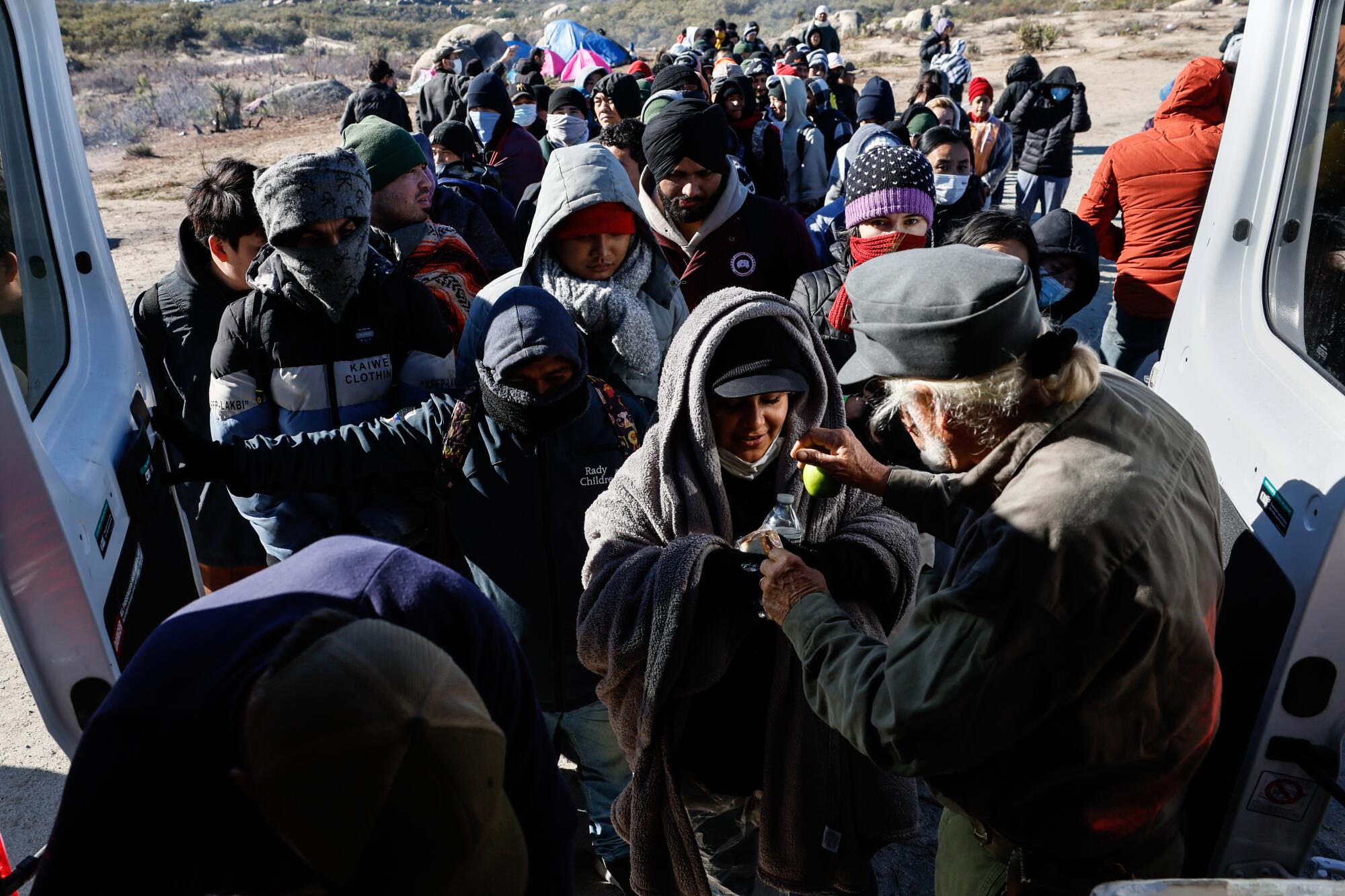
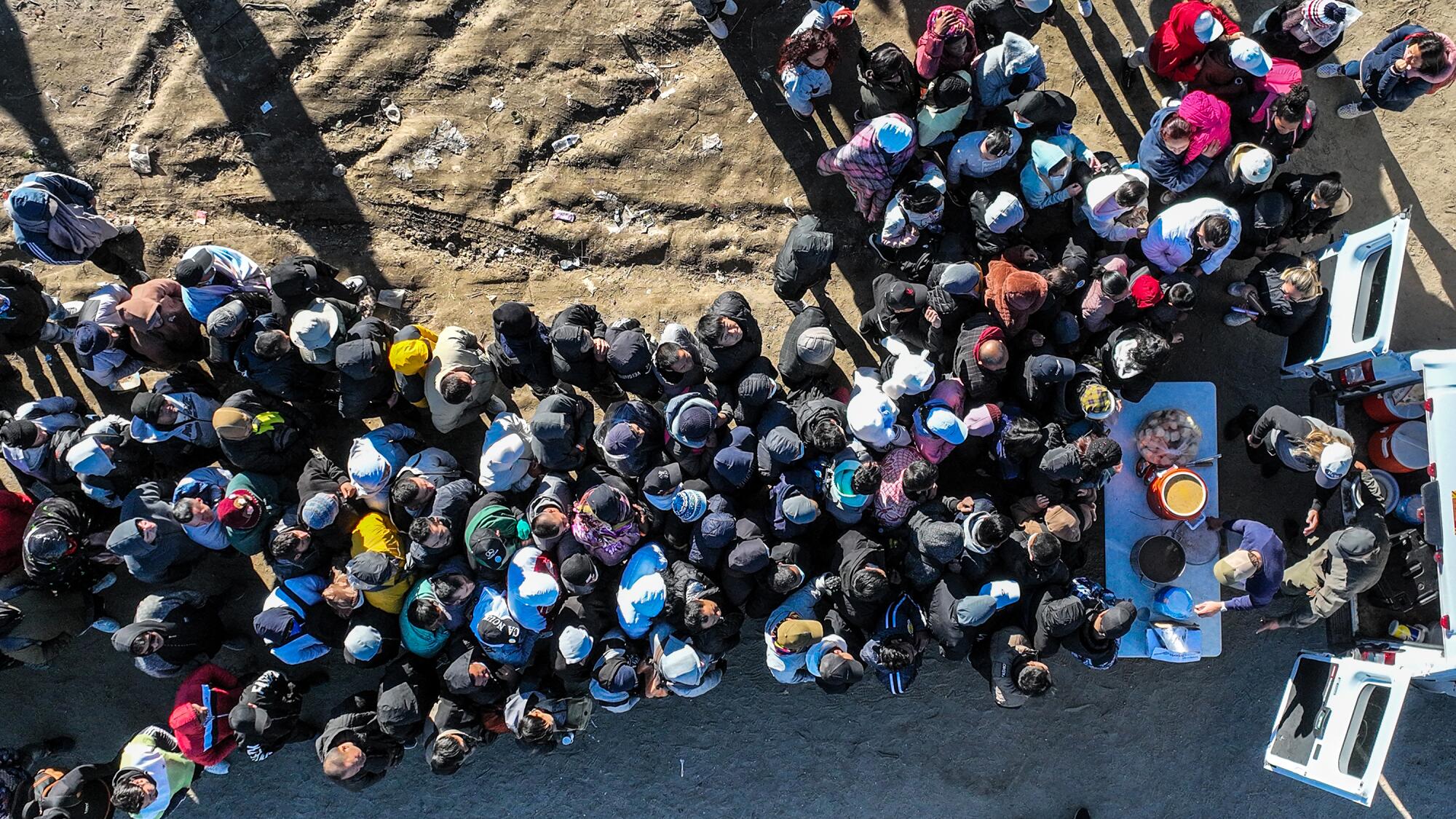
On a daily basis, Chelsie Ruiz cooks large batches of beans that volunteers serve in the afternoon. She knows many in the community are upset and accuse the volunteers who are providing aid of making matters worse.
“People keep claiming this is a political issue,” Ruiz said. “No, this is not politics. These are my legit neighbors. I was taught to love my neighbor.”
On Friday night, Ruiz stopped by with family members to drop off donated blankets, jackets and plastic shield masks to offer a little protection from the rain. In a moment of levity, they played music and kicked around a soccer ball with some of the migrants, and one Border Patrol agent joined in for a short period. By the end, her face and fingers were numb from the cold.
She worries constantly about the falling temperatures. Already, supplies of blankets and jackets are low. “The wind is what will really kill you out here,” Ruiz said.
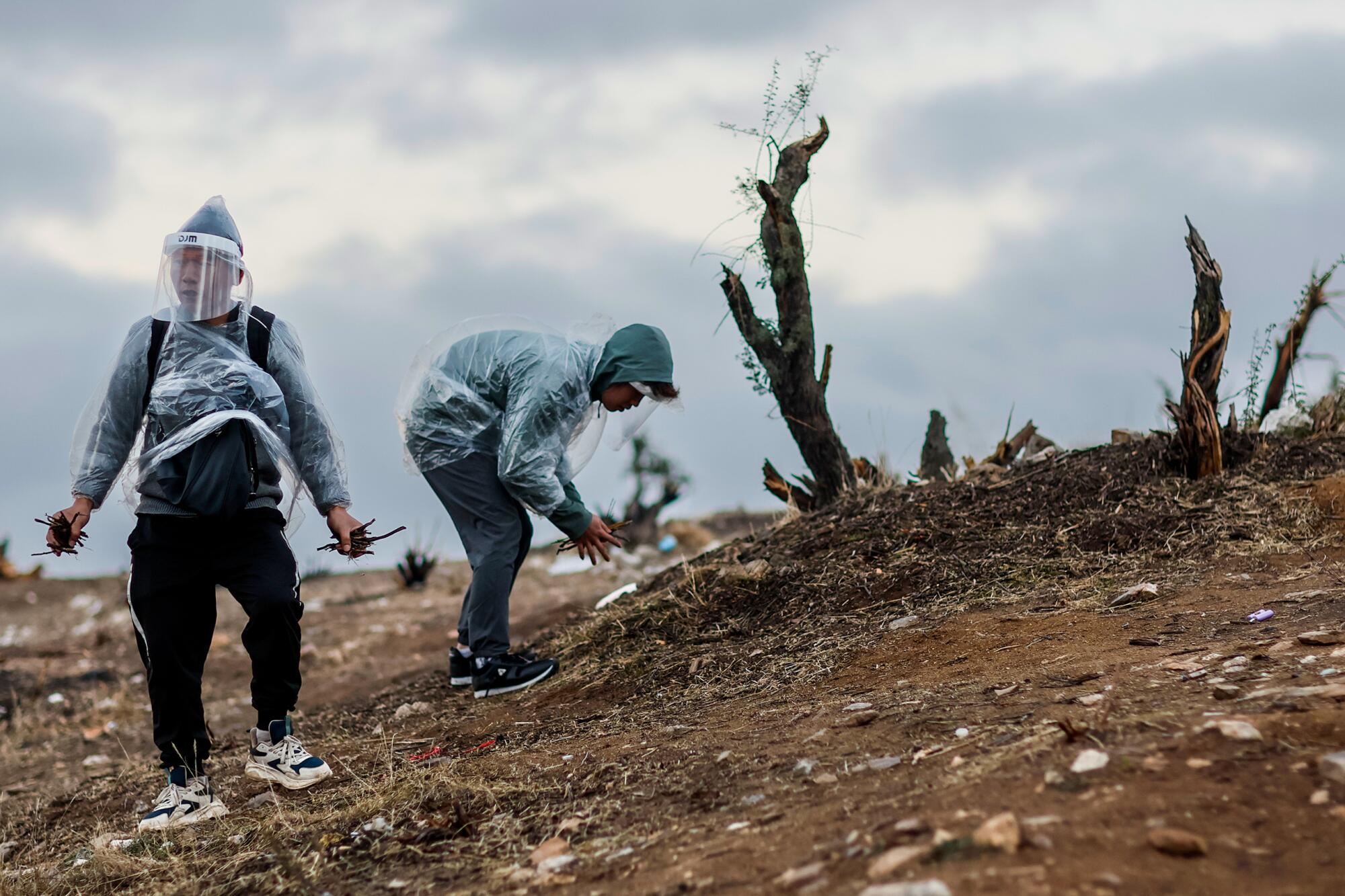
Migrant Daniel Lindarte said he had not realized they were on private property when they crossed into the U.S. on Saturday morning. Just a week ago, he said, his family were eating dinner at their home in Cúcuta, Colombia, with no intention of leaving. But he said his activism working with the local police department resulted in serious threats to his family’s welfare. Fearing for their lives, he said, they flew into Cancun before trekking north, coming with few clothes.
“We know this is not the right way to come to this country,” Lindarte said, holding his 12-year-old daughter close to keep her warm. “We didn’t come here because we wanted to. We came for better opportunities for our families.”
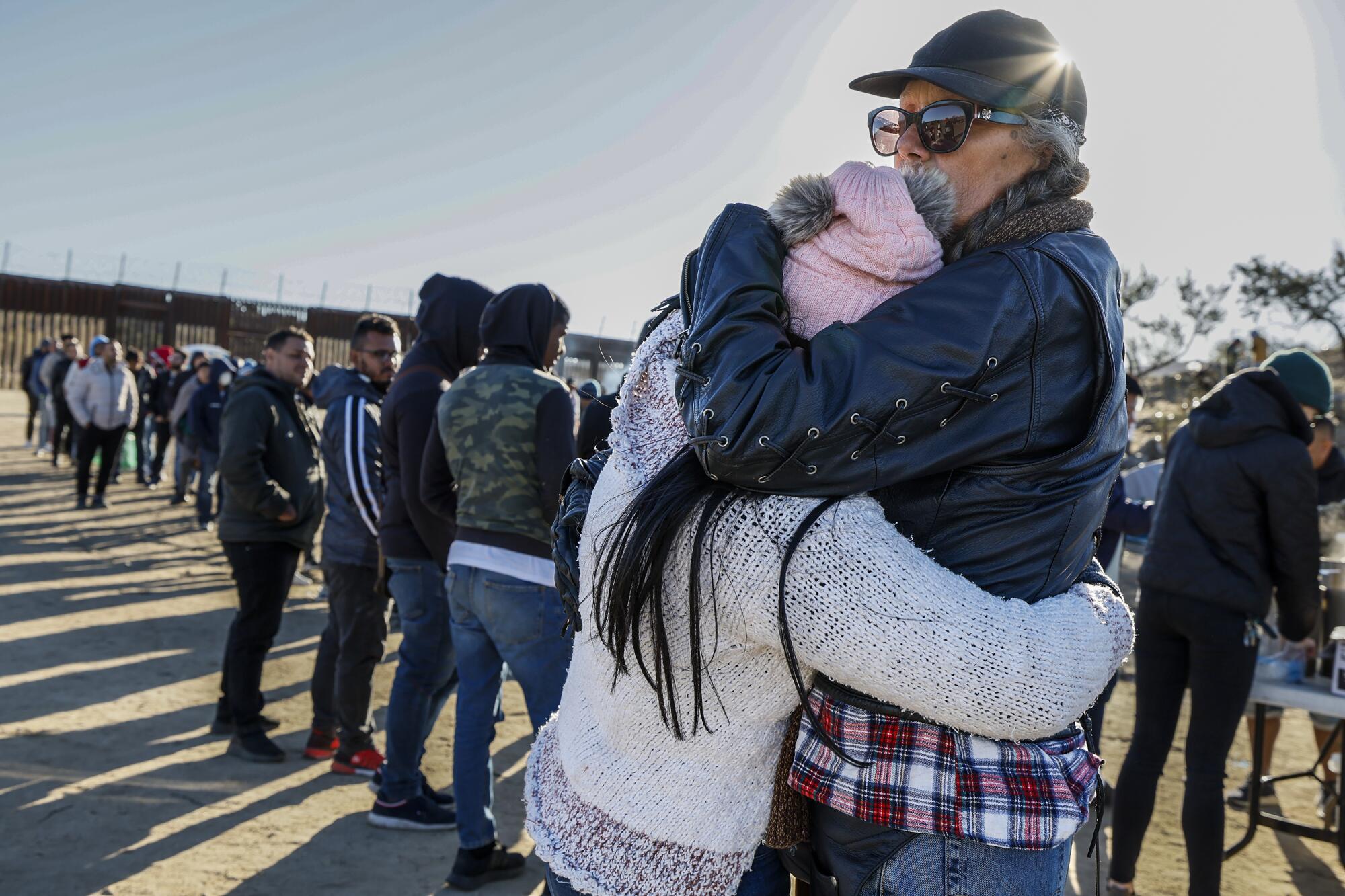
On Saturday morning, a group of volunteers pulled in with a U-Haul van to the camp known as 177. Migrants trailed the truck, lining up for peanut-butter-and-jelly sandwiches, an apple and bottled water. The volunteers returned later with a second meal of hot soup and beans.
Leidy, 26, is a Colombian refugee who declined to give her last name. She said she and her partner fled because gang members were demanding increasing amounts of money from her partner, who drove a taxi. They plan to seek asylum. “If we go back, they will kill us,” she said.
Karen Parker, a volunteer on site to provide first aid, embraced Leidy as she cried.
“I’m scared,” Leidy sobbed quietly. “Thank you.”
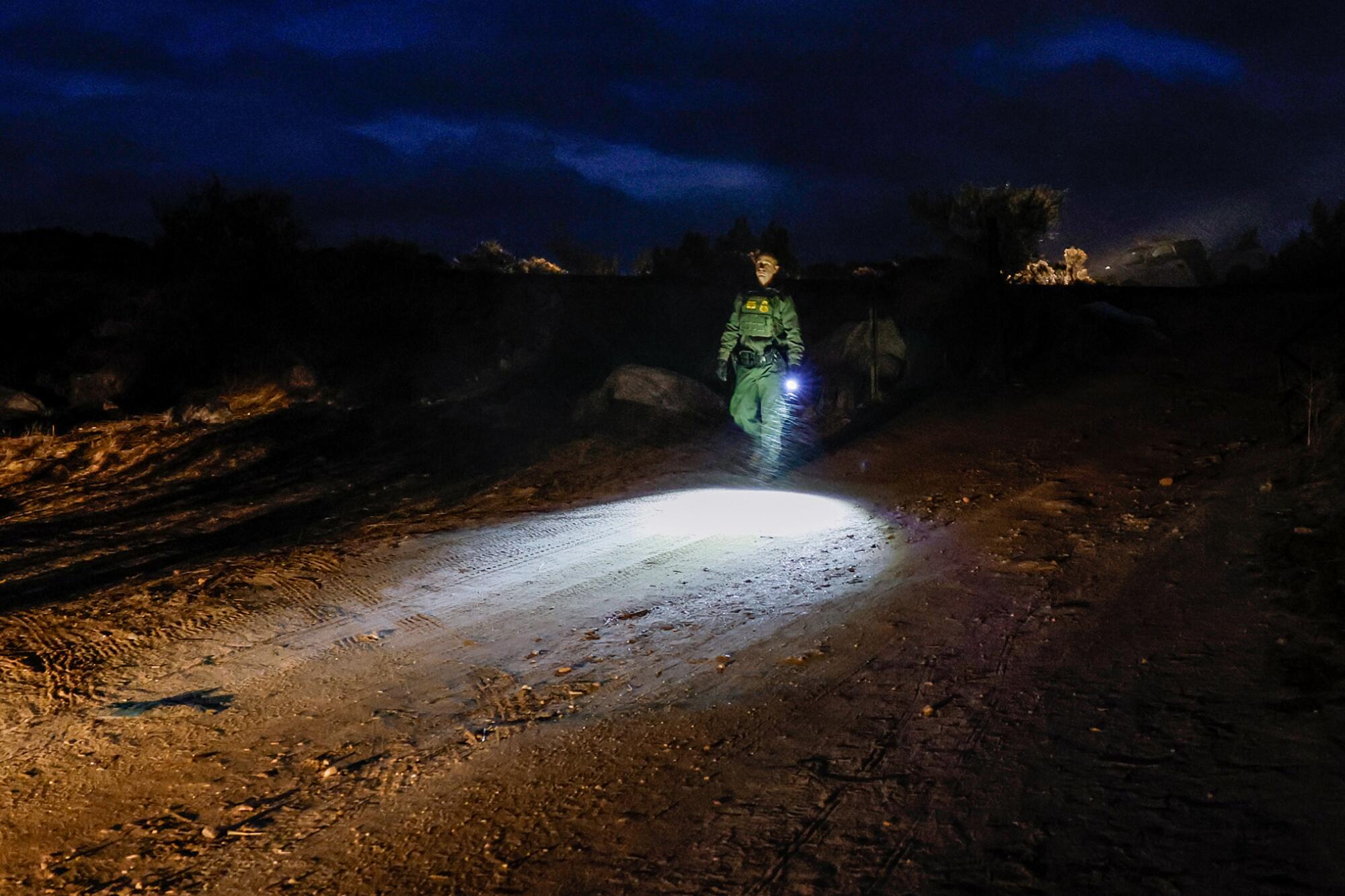
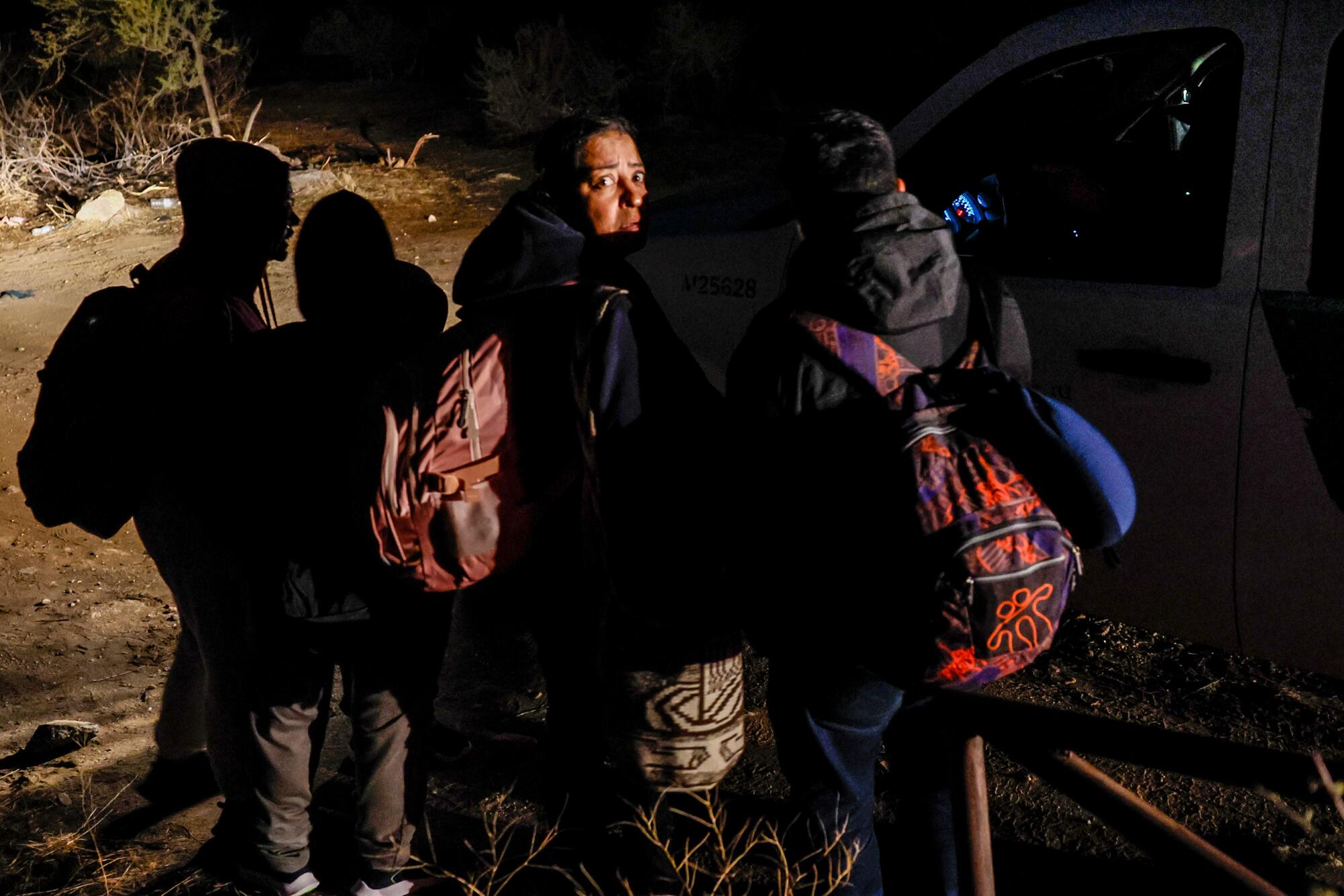
Wu Heng, 28, smoked a cigarette as the sun began to set over a camp near Interstate 8. The wind was picking up, and he and his 55-year-old father had not secured a tent for the night. Their camp was exposed.
Wu said he had worked for an electronics company in Sichuan province and hoped to go to Los Angeles to start a new life. Like other migrants, he said he was given little information about how long they would be on hold at the camp. On Saturday night, temperatures fell to 39 degrees.
On Sunday morning, he sent a plea to a reporter. “It’s so cold here,” he said, and they were still without a tent. Could someone please get them one?
Times staff writer Cindy Chang, photographer Robert Gauthier and researcher Valerie Hood contributed to this report.
Start your day right
Sign up for Essential California for news, features and recommendations from the L.A. Times and beyond in your inbox six days a week.
You may occasionally receive promotional content from the Los Angeles Times.
